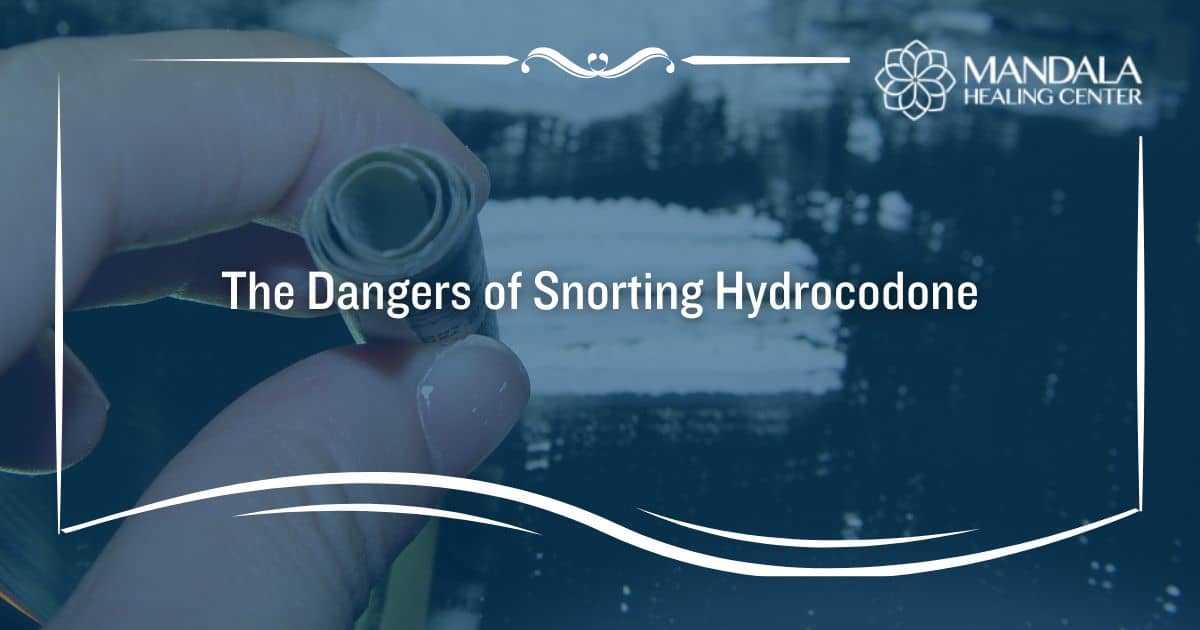Hydrocodone is an opioid pain medication that is prescribed to treat moderate to severe pain. While this substance is effective in helping patients manage the symptoms of pain, it is also highly addictive. According to the Drug Enforcement Administration (DEA), “6.9 million people in the U.S., aged 12 and older, misused hydrocodone” in 2016.[1]
Hydrocodone relieves pain by binding to opioid receptors in your brain. However, it also causes slowed breathing rates, relaxation, and euphoria. These side effects can be highly addictive, causing many people to continue taking hydrocodone even after they no longer need it for pain.
Once you are addicted to hydrocodone, you may start looking for new ways to increase its potency. One of the ways to do this is by snorting hydrocodone instead of swallowing it, but insufflation (snorting) comes with a variety of unique risks.
Why Do People Snort Hydrocodone?
If you abuse hydrocodone regularly, you will begin to develop a tolerance to it, so the dose you are used to taking will no longer affect you as greatly. This might cause you to begin using different methods of administration, like snorting, to increase the intensity of the high.
When you snort hydrocodone, the effects occur faster and at an increased potency. However, the high will be short-lived, making you more likely to abuse hydrocodone repeatedly. In other words, snorting this substance can cause you to binge on the drug, putting you at risk of taking too much and experiencing an overdose.
While snorting hydrocodone can cause you to experience a faster and more intense high, the medication is not designed to be used in this manner. Hydrocodone is intended for oral consumption and slow digestion only–not to be used intranasally.
The Dangers of Snorting Hydrocodone
Medications like hydrocodone are designed to be released into your body over time. For example, hydrocodone is supposed to travel through your digestive system before it enters other areas of your body, causing the effects to begin gradually and last for longer periods of time.[2] When you snort hydrocodone, it is absorbed through the mucous membranes in your nose, throat, and the roof of your mouth.
Snorting hydrocodone allows the drug to enter your bloodstream way too quickly. As a result, you might feel the effects within 2 to 15 minutes after snorting it. While snorting hydrocodone can produce the effects you are seeking, it is also incredibly dangerous.
Dangers include:
Nasal Damage
The tissue that lines your nasal passages is extremely thin and delicate. When you snort a substance like hydrocodone, the abrasiveness of the powder can cause damage to your nose. The immediate effects of snorting hydrocodone include nasal irritation, runny nose, and nosebleeds.
If you snort hydrocodone frequently, you are at risk of extensive damage to your nasal passages. Some of the ways this can damage your nose include:
- Nasal crusting
- Facial pain and swelling
- Difficulty swallowing
- Frequent nose bleeds
- Constant runny nose
- Perforation of the septum
Throat and Lung Damage
While your nose hairs are designed to protect your throat and lungs from irritants, they can be damaged when you are frequently snorting drugs like hydrocodone. As a result, the substance can reach your throat and eventually your lungs, causing further damage.
Snorting hydrocodone can cause irritation that leads to a hoarse-sounding voice. Once the substance travels to your lungs, you are at risk of developing lung inflammation, asthma, and even respiratory failure.[3]
Contracting Diseases
When you snort substances like hydrocodone with other people, you put yourself at risk of contracting blood-borne diseases like hepatitis or HIV. To explain, most people who snort substances use a straw or a rolled-up dollar bill to help the substance travel into their nasal passage. If you are sharing these straws or dollar bills with other people, you could be inviting their bacteria into open cuts in your nose caused by the hydrocodone powder.
Overdose
Lastly, because snorting hydrocodone causes a potent but short-lived high, you are more inclined to use large amounts of the substance at once. This puts you at risk of experiencing a life-threatening overdose.
The symptoms of a hydrocodone overdose include:[4]
- Breathing problems
- Blue-tinted fingernails or lips
- Cold and clammy skin
- Confusion
- Dizziness and drowsiness
- Fatigue
- Lightheadedness
- Loss of consciousness
- Low blood pressure
- Pinpointed pupils
- Nausea and vomiting
- Muscle twitches or tremors
- Seizures
- Weak pulse
- Coma
Find Help for Hydrocodone Abuse and Addiction
If you or a loved one frequently abuse hydrocodone, you might be addicted to it. Hydrocodone addiction must be treated by a professional drug rehab program where you can receive the support and tools you need to achieve long-term sobriety.
To learn more about our hydrocodone addiction treatment center, contact Mandala Healing Center today. Mandala’s Admissions Coordinators are available 24 hours a day.
References:
- The Drug Enforcement Administration (DEA): Hydrocodone, Retrieved June 2023 From https://www.deadiversion.usdoj.gov/drug_chem_info/hydrocodone.pdf
- The National Library of Medicine: Hydrocodone, Retrieved June 2023 From https://www.ncbi.nlm.nih.gov/books/NBK537288/
- The National Library of Medicine: Hydrocodone snorting leading to hypersensitivity pneumonitis, Retrieved June 2023 From https://www.ncbi.nlm.nih.gov/pmc/articles/PMC4900771/
- Medline Plus: Hydrocodone and Acetaminophen Overdose, Retrieved June 2023 From https://medlineplus.gov/ency/article/002670.htm












